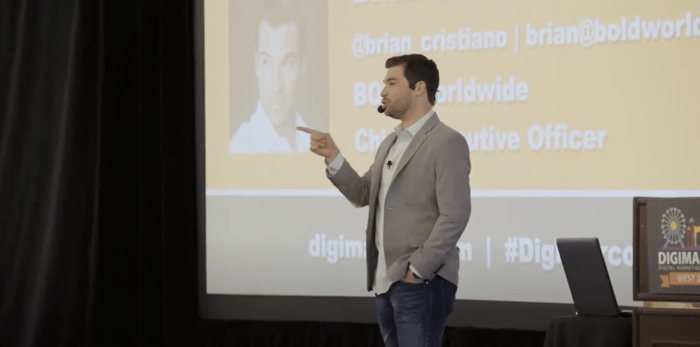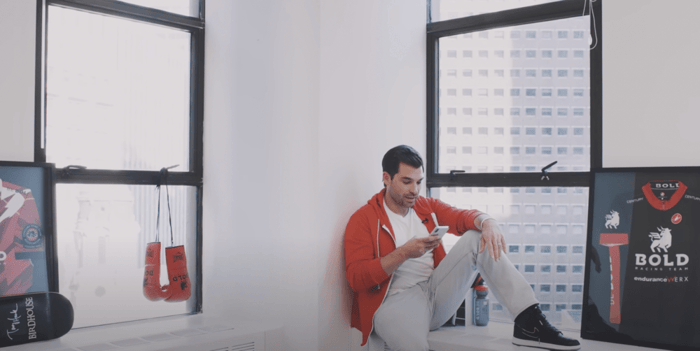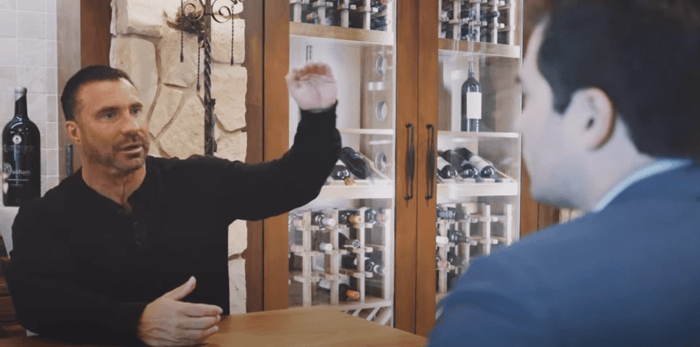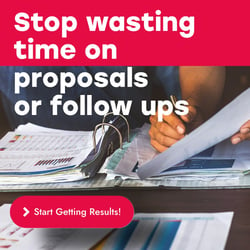Just because everyone is doing something doesn't mean that it's good, right, or effective. This truth couldn't be more true for B2B sales techniques...
Believe it or not, but some of the most common sales techniques you read about online aren't just bad, but they set you up for failure! Not only that, but they’re promoted by online gurus as being highly effective techniques.
Don't believe us?
If these very common, widely-recommended techniques were effective, then why do so many high-potential sales professionals struggle with sales...?
To finally set the record straight, we're sharing 6 B2B sales techniques that will certainly fail you! By that, we mean that these 6 techniques, while very popular, will wreak havoc for several reasons, including:
- Taking power out of your hands
- Making you feel out of control
- Ultimately not achieving sales and business goals
Again, just because every B2B salesperson is doing something doesn't mean it's right!
If you want to up your sales game to get the kinds of business outcomes you dream about, then don't even consider using any of these 6 techniques.

1. Offering a Free Initial Assessment
Is one of the first steps in your sales pipeline offering a free initial assessment to potential B2B buyers, hoping that it'll convince them that you're awesome and incentivise them to buy from you?
If so, then stop right where you are in your tracks!
While it really does sound like a great idea, offering a free initial assessment before the qualified lead is your paying client has several negative repercussions, including:
- Taking all the power out of your hands
- Wasting time that could be spent doing something better
- Reducing you to a vendor
Again, while it might sound like a genius idea to offer an incentive right off the bat, it'll only lead to problems later down the line. Before you know it, the prospect will be walking away with free value, and you'll be left in the dust.

Would an Expert Surgeon Offer a Free Trial Operation?
Remember, the reason why a B2B company works with you is because they see you as an expert at what you do!
Thanks to you… You showed them that they had a problem, clarified the problem, and offered a solid solution to it.
That being said, giving away free value immediately strips you of your expert status!
Think of it like this... If you went to see an expert orthopedic surgeon and they offered you a free trial operation or medication before doing the real surgery, wouldn't you be taken back? Wouldn't you think to yourself that this person is supposed to be an expert, and therefore question why they're giving something that's so high-value away for free?
Bottom line: Think like an expert surgeon does! You wouldn't ever want to lose your expert status by handing out free value, so simply don't do it.
Free Assessments Reduce You to a Vendor
Here's the thing... Literally every B2B salesperson offers a free assessment right off the bat.
Given that that's the case, why would you want to blend in with everybody else, including your competition? Wouldn't you want to offer something different in order to stand out?
If you're an effective B2B sales pro, then of course you want to do something different to stand out!
That being said, from now on, no more sending free assessments early on in the sales funnel (or at any other point) to the prospect until they've converted into a paying customer.
Instead of offering a free assessment, what you should do is turn the tables on the prospect. By that, we mean that you should say something like, 'Now, I could send you an assessment of what I think we need to do, but I don't even know you well enough yet! Why don't we schedule another call tomorrow so that I can learn more about you and what direction you want to take your business in?'
By turning the conversation back on the prospect, not only will the decision-makers appreciate the heck out of you, but you'll elevate out of replaceable vendor status to irreplaceable expert status.

2. Allowing Potential Customers to Tell You Their Pain Points
How many times has a supposed sales guru tried to convince you that the role of a B2B sales team is to simply ask questions and then let the prospect tell you what their pain point is?
If you're like most salespeople, then you've heard that many, many times before.
While asking questions and listening attentively is of the UTMOST importance, never at any point should you let a prospect tell you what their problem is.
Think of it like this... When you go to see a doctor for regular back pain, the doctor asks you plenty of questions and then listens attentively. But, never at any moment do they ask you to self-diagnose. They're there to gather information and then diagnose you like the expert they are, not the other way around!
At the end of the day, B2B selling works the same way as a doctor's office: It's your job to play the role of a doctor by hearing your high quality leads out, and then telling them what's up. Never let the lead self-diagnose.

B2B Customers Don’t Know What Their Problems Are
Here's the thing: If your prospects knew what their problems were and how to solve them, then why would they be there talking with you? Literally, why would they be sitting there listening to you if they knew what was up?
If your prospects knew what their problems were and how to solve them, then they wouldn't have gotten themselves into the buying process in the first place!
The moment that you let prospects tell you what their problems are instead of you telling them what they are is the moment that:
- You become a vendor
- You lose all of your control over the selling process
If some sales rep tries to tell you that you just need to let customers tell you what their problem is, then ask them what's the point of having a sales department at all.
Only YOU Know What your Ideal Customer’s Problems Are
If you generate a lead through an inbound channel, then odds are that the lead has at least somewhat of an idea of what their problem is, but they just don't know how to solve it. Unfortunately, though, inbound leads are rare and usually make up no more than 10% of a company's CRM.
On the other hand, outbound leads make up the other 90% of the CRM, and very rarely do they realize that they even have a problem in the first place.
Therefore, it's your job in that initial cold call or social media message to tell the prospect that they've got an obvious problem and it's about time they investigate it with you!
You could wait forever for inbound leads to slide into your LinkedIn DMs, but do you really want to take that chance?

3. Openly Negotiating Price to Close More Deals
How many times do you reach the end of the sales cycle when a purchasing decision is about to be made, and then all of a sudden get hit with a 'Let's discuss price'? Or even worse, how often do you feel completely out of control during the sales cycle, so you offer to negotiate your price if it gets the prospect to make a buying decision in your favor?
If you're like most salespeople, then you're probably no stranger to negotiation.
However, you should never, ever leave any room in your B2B sales cycle or mind for negotiation! Just like how offering a free initial assessment or letting prospects take over the situation strips you of your expert status, so does negotiating.
The moment you offer to negotiate your price tag will keeping the deliverable as it is is like shooting yourself in the foot.
Not only does it strip you of your expert status and reduce you to a vendor, but it also damages the ensuing customer relationship.
While you certainly shouldn't negotiate your price tag, that doesn't mean that you can't be flexible. For example, if a customer can't afford the upfront cost of your deliverable, offering a payment plan instead of dropping your price is a legitimate solution.
Negotiating isn't worth it in the end. Sure, you might close the deal, but you're setting the stage for even worse problems down the road.

Would an Expert Surgeon Negotiate the Cost of Surgery?
Once again, put yourself in the shoes of an expert surgeon... Would they ever negotiate the cost of a surgery?
Of course not.
Therefore, you shouldn't negotiate either, unless you want to be reduced to a vendor!
Or, if you believe that you're not really worth your price tag, then go ahead and negotiate. But given that you're reading this, we don't think that you're one of those people.
Negotiating Hurts the Customer Relationship
Business-to-business sales is about building relationships between two B2B companies. It's about an equal exchange in value between the two parties.
In order for the relationship to work, that exchange must remain equal, otherwise it will ultimately implode.
Think of it like this... If you have a friend in your life who never calls you, asks you to hang out, and is always asking you to cover for them while never returning the favor, wouldn't you feel jipped? As much as you like them, wouldn't it make you resentful and not want to contribute to the friendship anymore?
While B2B relationships and friendships have their differences, they're both built on the same premise: There must be an equal exchange in value.
If there isn't an equal exchange, one of the parties will explode later down the line.

4. Using a ‘Nice Guy’ Sales Approach
One of the worst B2B sales tips you could ever be given is to be a 'nice guy' with prospects. By a 'nice guy', we mean that you:
- Only tell the prospect what they want to hear
- Speak with a soft tone of voice
- Let the prospect dominate the entire conversation
Instead of having a 'nice guy' sales approach, you should approach every sales scenario assertively. Whether you're doing cold outreach or pitching the final deal, you need to assert yourself.
While you might think that being very nice will make the prospect like you and want to buy from you, that simply isn't the case.
In the end, niceness doesn't motivate prospects to buy from you! What does motivate them to buy is if they see you as an irreplaceable expert.
There's a lot of 'nice guys' in the world who always get run over by prospects. Ultimately, if you're overly-nice, you won't close the deal and the prospect won't get the solution they need.

Prospects Want Honesty
Straight-up: Sometimes being overly-nice forces you to dance around the truth of a situation.
For example... Imagine again that you go to an appointment with your doctor for crippling back pain. The doctor knows you need surgery but hesitates to say it out of fear that it'll freak you out. Instead of telling you the truth, they send you to physical therapy. One month later, you're back in their office with even worse pain!
At the end of the day, while being completely honest might sting the prospect a little bit, they will be thankful for it in the end.
If you were in your prospect's shoes, wouldn't you want an expert to be totally honest and thorough with you?
As long as you deliver your expertise with grace, the prospect will thank you for your honesty.
Assertiveness Works
Instead of being 'nice', you should be assertive.
Now, don't get things twisted... To be assertive doesn't mean to be aggressive, mean, pushy, or overbearing. Rather, it's about being straight-up with prospects in order to assert yourself as a person with the right solutions for them.
Unless you're assertive, prospects won't get a grip on the severity of their issue. On top of that, they won't understand that you're the ideal person to solve it.
Bottom line: Assert yourself as the expert you are with the perfect solution. It's the only way for both parties to walk away with what they need.

5. A Noisy B2B Sales Strategy
Think of a sales strategy as the blueprint for bringing your sales visions to life. By fulfilling each piece of the strategy, your vision comes to life.
However, one of the most pervasive mistakes that B2B salespeople consistently make with their strategy is making it exceedingly noisy. By noisy, we mean that it is:
- Unnecessarily complex; and
- Longer than it needs to be.
A noisy strategy makes your life more difficult AND crushes your ultimate sales outcomes.
As a 21st century sales professional, you probably already have enough noise in your life that makes the day-to-day more difficult than it needs to be. Additionally, you know that all that noise ultimately makes you a less effective representative.
Therefore, don't add more noise to your already noisy life! Instead, focus on clarifying your strategy by removing the unneeded noise.
Noise Drowns Out Your Message
In each of your sales encounters, you want to send a clear message to prospects that you're the expert with the right solution for them. There isn't a whole lot to it other than that...
But, by over-complicating the heck out of your strategy, you'll ultimately minimize the impact of that message.
With a noisy sales strategy, your B2B sales process will become noisy. With a noisy process, your prospects have too many directions to look in.
Bottom line: If there is any one thing that you want your prospects to focus on, it's that you're the expert who they NEED, because that's what motivates them to buy. But, if your strategy is noisy, the impact of that message is minimized and they're less motivated to buy.
Noise Makes Your Life Worse
Not only does a noisy strategy take the impact out of the message you're trying to send, but it makes your life significantly worse off.
Before going any further, take a step back for a second and ask yourself whether or not your mind and life are currently very cluttered.
By that, we mean to reflect on whether or not you have clarity in your life, or if most of your time is spent trying to clear your path rather than actually taking action.
Given that we live in such a noisy world, odds are that you live a cluttered life! Not only do you probably live a cluttered life, but your life is worse off because of it.
Furthermore, having a noisy strategy infects the rest of your life. As a result your personal and business life are worse off than what they should be.
In order to get your sales life and personal life back in the green, remove the noise from your existing strategy rather than adding more junk on top of it!

6. Selling Logic
Picture this: Let's say that you have crippling back pain and are sitting in the doctor's office waiting for the orthopedic surgeon to come in. When the surgeon finally comes in, they tell you that your scans show herniated discs, and that they will need to perform surgery to correct them. Not knowing what a herniated disk is or the impacts it could have on your life, you walk out of the office that day unsure of whether or not surgery is a good idea. Then, a few days later, you're at a different doctor's office getting a second opinion.
Now... What could the first surgeon have done better to make you jump up and say, 'Wow, how soon can you get me on the operating table?'?
What they could and should have done is hype up your emotions rather than just tell you all the facts.
For example, they could have stressed the debilitating physical impacts that you would have if you didn't get the surgery, instead of just explaining the issue and the facts of it.
That being said, you will almost never motivate your prospects to buy from you if you try to sell them on facts... Instead, what you need to do is tell them the facts and then amp up their emotions.
Facts tell, emotions sell.
From now on, dive into the tech specs of your deliverable, but don't think for a second that the prospect will buy from you unless you tug at their emotions.

Speak Facts But Hype Up Emotions
Believe it or not, but one of your most powerful sales tools in the world is your prospect's own emotions.
If you know how to harness the power of their emotions, you can motivate them to buy.
On the flip side, if you don’t harness your prospect’s emotions, then they could use them against you and themself.
Again, we're not saying that you shouldn't speak facts. However, we are saying that you shouldn't rely solely on stating facts to make the sale. At the end of the day, people make buying decisions based on emotions, not the facts of the situation.
Tell a Story In Sales Pitches
Perhaps the best way to hype up your prospect's emotions is through sales storytelling.
Sales storytelling is all about framing your prospect's buying journey into a big deal story. In each of your stories, the prospect is a hero and the magic potion they need to slay their pain point is the solution that you bring to the table.
The idea is to stress the impact of what will happen if they don't take you up on your offer. For example, if they don't choose your solution, then their pain point (or the villain of the story) will overcome them and they'll end up losing the epic battle.
In addition to storytelling, hype of emotions by:
- Creating a sense of urgency
- Sharing customer success stories (to ignite FOMO)
- Continuing to assert yourself as an expert
Whether they know it or not, every B2B buyer is on their own hero's journey. Play to that fact by turning their buyer's journey into an epic story in which they're the main character!

Final Thoughts on B2B Sales Techniques That Will Always Fail You
Bottom line: You can try these 6 selling techniques for yourself, but it's probably better to learn from other people's mistakes and avoid using them rather than making the mistake yourself!
Never forget that sales is at the core of business success... Poor sales = poor business. Therefore, using any one of these techniques doesn't just set you up for poor sales results, but overall poor business outcomes.
You know what it takes and doesn’t take to achieve sales success, so now it's just a matter of putting your knowledge to use. Remember, without sales success there cannot be business success!
You May Also Like
These Related Articles

5 Signs You’re Overthinking Your B2B Sales Strategy

Are You Sabotaging Your Own Business Growth? | 8 Signs




